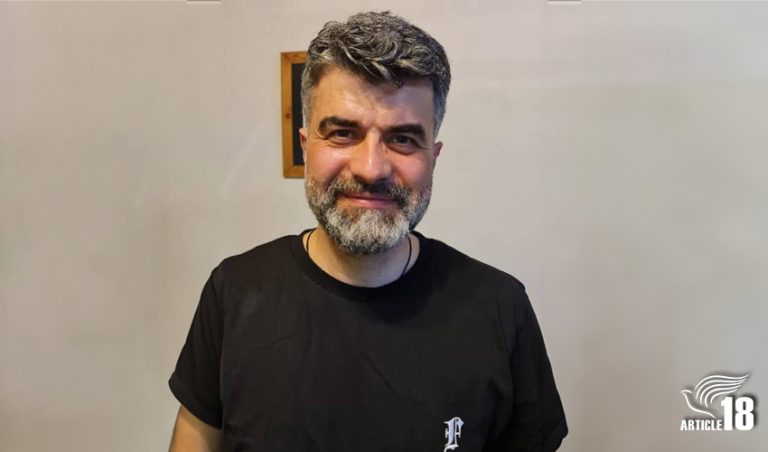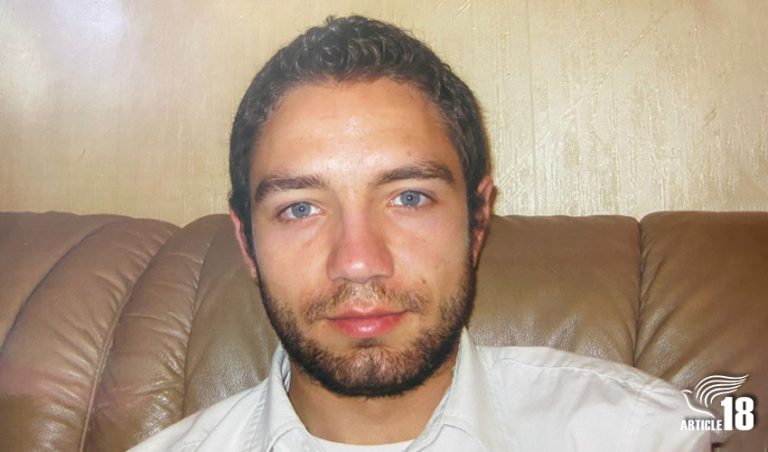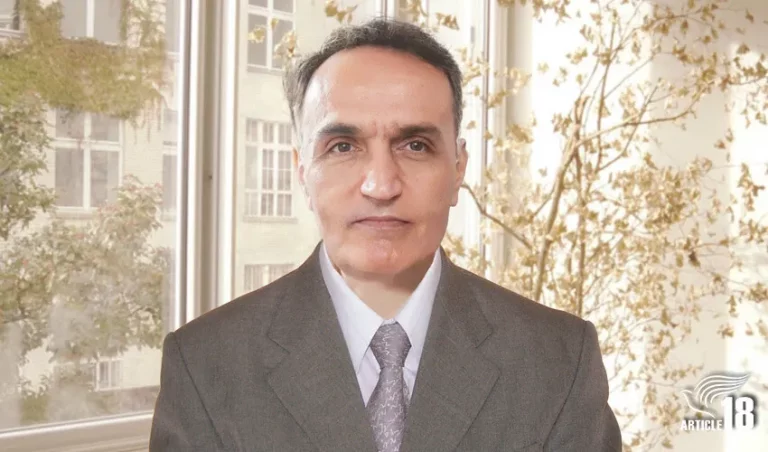This case study was used as part of a UK government-funded report into the persecution of Christians worldwide. The case involves four converts: Pastor Yousef Nadarkhani, Yasser Mossayebzadeh, Saheb Fadaie, and Youhan Omidi.

Case referenced by
Human Rights Activists News Agency, Christian Solidarity Worldwide, Forbes, Middle East Concern, Release International.
Short Summary
On Friday 13 May 2016 Iranian security forces raided a house-church and arrested five members including Pastor Yousef Nadarkhani and his wife, Tina. They were released the same day but the other three were detained. Two months later, on 24 July 2016, Pastor Yousef was summoned and detained in Rasht prison, charged with “acting against national security”. All four of the above men were members of the leadership team of the “Church of Iran”. (The “Church of Iran” is a Unitarian denomination that has been targeted in recent years. Over the past eight years, a number of its members have been detained, including these four men, who were all sentenced to 10 years in prison, though their sentences were later reduced.)
Background events
On Friday 13 May 2016 security forces raided a house gathering of a group of converts and arrested five members including Pastor Yousef and his wife, Fatemeh (Tina) Pasandideh, along with Mohammad Ali (Yasser) Mossayebzadeh, Zaman (Saheb) Fadaie, and Mohammad Reza (Youhan) Omidi.
All four men were members of the leadership team of the church. Prior to the raid, VEVAK (MOIS) officers summoned Saheb and Youhan to their offices by telephone, telling them that their homes had been raided and they had seized their Bibles, computers and mobile phones. (Iran’s intelligence service is called, in English, the Ministry of Intelligence and Security, or MOIS, and, in Persian, Vezarat-e Ettela’at va Amniat-e Keshvar, or VEVAK.)
Pastor Yousef and his wife were released the same day, but the other three remained detained. After two weeks in prison, they were all released on bail of 100 million tomans (around $33,000).
On 24 July 2016 Pastor Yousef was summoned to the 13th Branch of the Revolutionary Court in Rasht. He was formally charged with “acting against national security” and given until 31 August to deposit his $33,000 bail. He was held in Rasht Prison on 1 and 2 August, but was released after title deeds were submitted.
On 10 September 2016, Saheb and Youhan were summoned to Rasht Court to answer charges of drinking wine during communion, and were sentenced to 80 lashes each.
On 15 October 2016, Yasser, Saheb, and Youhan had a hearing to face charges of “acting against national security”.
On 8 May 2017, all four had a hearing at the branch of the revolutionary court presided over by Judge Masha’allah Ahmadzadeh. The second hearing was scheduled for 14 June.
On 6 July 2017 Pastor Yousef, Youhan, Yasser, and Saheb were given 10-year prison sentences for “acting against national security by propagating house-churches and promoting Zionist Christianity”. Pastor Yousef and Youhan were also sentenced to two years’ exile – Pastor Yousef in Nik-Shahr and Youhan in Borazjan. Both of these locations are in the south of the country, far away from their families in Rasht. The verdict was dated 24 June but was received by the lawyer for the four men on 6 July. They lodged an appeal.
On 14 December, 2017 the appeal court took place. On 2 May 2018 all four received notification from the appeal court through their lawyer that the 10-year prison sentences were upheld by Judge Hassan Babaee.
On 22 July 2018, Pastor Yousef was taken to Evin Prison in the capital, Tehran, after a violent raid on his home in the northern city of Rasht. The other three members of his congregation sentenced along with him were also taken to Evin the following day. They had been expecting a summons to serve their sentences. However, rather than being summoned, plain-clothed officers forced their way into Pastor Yousef’s home early on Sunday morning. The officers asked for Pastor Yousef after his teenage son, Danial, opened the door. When he went to call his father, the officers attacked him with a taser and incapacitated him. When Pastor Yousef came, they also tasered him, before taking him away. The security forces used unwarranted and excessive force: Pastor Yousef was beaten up, despite the fact that neither he, nor his son, had offered any resistance. Pastor Yousef was able to call his family from Evin Prison on 23 July to let them know he was being held there, in quarantine, before being transferred to Ward 8 of Evin Prison.
Previous arrests
Pastor Yousef was initially arrested in 2009 after going to his children’s school to question why all students – even if their parents were Christian – needed to study the Quran. He was charged with “apostasy” and sentenced to death in 2010, a decision that was upheld by the Supreme Court in 2011. The pastor was repeatedly asked to renounce his faith during court hearings in order to avoid the death penalty, but he refused.
On 8 September 2012, he was released from prison following his acquittal on apostasy charges, though he was found guilty on charges of “evangelising Muslims and conducting illegal house-church services in his home”, for which he received a three-year sentence. Pastor Yousef was re-arrested on Christmas Day 2012 on the orders of the director of Lakan Prison, where he had been held, ostensibly to serve the remainder of a three-year sentence. He was released once again on 7 January 2013.
Youhan was initially detained on 31 December 2012, during the annual government crackdown on house-churches around Christmas time. He was part of a group of four converts who in October 2013 were charged with “drinking alcohol during a communion service, and possessing a receiver and satellite antenna”. That group were also sentenced to 80 lashes each.
In February 2015, all four men were briefly detained following similar raids.
Analysis
There has been a significant increase in human-rights violations in Iran in recent years, and particularly in the persecution of religious minorities, including Christians from a Muslim background.
The Iranian constitution supports freedom of religion for religious-minority groups recognised by the government – those being Christians, Jews and Zoroastrians. Though apostasy is a crime under Islamic law, the Iranian Penal Code has not specifically assigned any punishment for apostates. (Apostasy has always been a controversial issue within Shia Islam. There is no agreed understanding among clerics and Islamic scholars on what actually constitutes apostasy. The issue has been discussed in parliament several times – the latest took place in 2015 on whether to enter apostasy into the Iranian Penal Code. The parliament did not come to a full agreement and it is therefore an ongoing debate.) However, there are several legal provisions that give judges the discretion to find defendants guilty of apostasy. These provisions give more power to prosecutors and judges to bring charges of apostasy along with other crimes related to national security and politics. Moreover, in recent years, converts to Christianity have not been charged with apostasy but rather with “crimes against the regime” and “acting against national security”. Those charges are mainly political charges rather than religious. This might be mainly to avoid an international outcry at religiously-motivated charges such as apostasy.
Those detained or charged often have to obtain and hand over exorbitant amounts for bail, which are often forfeited as some choose to flee the country in the knowledge that they are very unlikely to receive a fair trial and just verdict. Those awaiting trial who flee the country are tried in absentia.
Many face a gruelling legal process, and until their case is heard, which could take several years, their lives are in limbo.
Therefore the majority of the Christians arrested in the last few years have been released, either after finishing their prison sentences, or temporarily released on bail with severe warnings and threats against any further Christian activity. Once released they are closely monitored, and risk re-arrest and imprisonment if they engage in or are suspected of engaging in any Christian activity.
UK involvement
There has been UK local diplomatic activity in support of Pastor Yousef and others going back to the time of his first imprisonment. Ministers have also made statements bilaterally and in multilateral fora where resolutions condemning breaches of human rights in Iran have been supported at both the UN General Assembly and Human Rights Council.
Latest updates
In October 2019, the four men’s appeals for a retrial were granted, but they were denied temporary release from prison during the process, even after the outbreak of the coronavirus in early 2020.
In June 2020, Saheb and Pastor Yousef’s sentences were reduced to six years, and Youhan’s to two years, at a retrial.
Yasser was not part of the retrial bid.
Youhan was released from prison on 18 August 2020, but was told to report back for his two-year term in exile a few weeks later. He began his term in internal exile on 14 September 2020.
One month later, on 14 October 2020, Youhan received 80 lashes for his 2016 conviction for drinking wine during Communion. One month later, on 15 November 2020, Saheb was also flogged for the same “offence”.
Later that month, the UN’s Working Group on Arbitrary Detention ruled that the Iranian government was guilty of arbitrarily detaining Pastor Yousef, and called for his immediate release and for compensation and “other reparations” to be given to him.
In January 2021, Yasser’s 10-year sentence was reduced to three years. He was granted conditional release on 22 February 2021, on the proviso he engages in no further Christian activity. It is understood he was pressured to recant his faith in order to secure an early release.
In September 2021, Saheb was granted 15 days’ leave, but then cruelly denied an extension to be present for his daughter’s 15th birthday, despite being initially led to believe his request would be granted.
In February 2022, Saheb and Yousef were among four converts to fall ill following a suspected Covid-19 outbreak within their ward at Evin Prison.
On 15 April 2022, Yousef was given his very first break from prison, a week’s furlough on bail of 300 million tomans (around $11,500), which was later extended by a further seven days, for which he was eligible having never previously taken any leave. He had been denied his first request for a furlough.
On 6 June 2022, Youhan was finally told he could return home, his term of exile completed.
In February 2023, first Saheb – on 9 February – and then Yousef, on 26 February, were released as part of a wider amnesty of prisoners on the occasion of the 44th anniversary of the Islamic Republic.



0 Comments
Trackbacks/Pingbacks